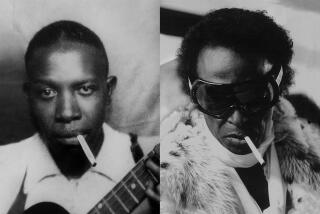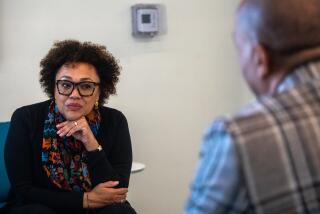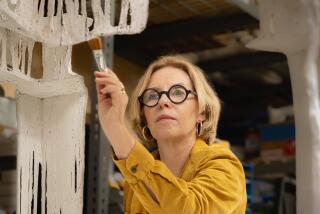Sally Lilienthal, 87; raised funds aimed at peace, global security
- Share via
Sally Lilienthal, a sculptor who made peace and global security her mission by founding the Ploughshares Fund, an influential foundation dedicated to preventing the spread and use of nuclear, biological and chemical weapons of war, has died. She was 87.
Lilienthal, a longtime human-rights activist who also was a fixture of San Francisco society, died Tuesday at California Pacific Medical Center in San Francisco of a bone infection that led to pneumonia, said Deborah Bain, a fund spokeswoman.
Since its founding in 1981, Ploughshares has awarded more than $40 million to groups and individuals, making it one of the largest grant-making foundations in the United States dedicated exclusively to peace and security funding, according to the fund.
“I had a little money and I wanted to make it work in the most creative and practical way,” Lilienthal told the Boston Globe in 1987. “I get lots of letters asking for money. But it’s almost impossible for the individual who wants to contribute to decide who is doing a good job.”
On her own, Lilienthal raised $100,000 for the fund in its first year. An anonymous donor, presumed to be Lilienthal, provided $250,000 a year to cover the fund’s administrative costs, which allowed all gifts to go toward grants, according to a 1988 story in the Chicago Tribune.
By creating a foundation that could collect contributions and research causes, Lilienthal “made it a one-stop shop for individuals who care about peace and security,” Naila Bolus, the fund’s executive director, told The Times.
Lilienthal concentrated on giving money to start-up causes, based on the theory that the first grant is often the hardest to get. Most of the money comes from thousands of individual contributors, Bolus said, and is quickly given away. The group now gives away about $4 million a year.
The name “Ploughshares” comes from a passage in the book of Isaiah in the Bible that reads, “They shall beat their swords into ploughshares.... neither shall they learn war anymore.”
One recipient of early funding was the International Campaign to Ban Landmines, which received the Nobel Peace Prize in 1997 and helped bring about a global treaty to abolish antipersonnel landmines.
“She was really proud of Ploughshares’ interest in and ability to take risks and move quickly,” Bolus said.
When a team of American scientists called the Natural Resources Defense Council needed money to travel to the Soviet Union to study whether underground nuclear tests could be detected with modern seismic monitors, Ploughshares awarded a grant in little more than a day. The scientists’ work in 1986 proved that a ban on nuclear testing could be verified.
“Ploughshares has been a major player, and that’s in a field where for most of history it’s been very hard to raise a lot of money,” George Perkovich, vice president for studies at the Carnegie Endowment for International Peace, told The Times. “When Ploughshares started, no one was as organized and did as much vetting and investigating as they did of the causes they support.”
Other grant recipients have included a Japanese nuclear scientist who worked to prevent the stockpiling of plutonium in Japan and the author of a paper on the history of Israel’s nuclear weapons program.
“Sally was a real maverick, a tell-it-like-is person,” Perkovich said. “She wasn’t afraid of being popular or unpopular. She did what she thought was right. She was fearless.”
Sally Ann Lowengart was born into a well-to-do family in Portland, Ore., on March 19, 1919, and moved to San Francisco when she was 12.
In 1940, she earned a bachelor’s degree in English from Sarah Lawrence College in New York and returned to San Francisco admittedly more liberal than she had left.
During World War II, Lilienthal worked in the Office of War Information in Washington, D.C.
Lilienthal had five children under the age of 7 when her first husband died in 1953. Several years after a second marriage failed, she married Philip Lilienthal, an associate director of the University of California Press. He died in 1984.
The Lilienthals founded the Northern California Committee of the NAACP Legal Defense and Education Fund in the 1970s. At the same time, she served as national vice chairwoman of Amnesty International.
In 1950, she studied sculpture at what is now the San Francisco Art Institute and became known for “very edgy, innovative” work, often made of plastic and resin, said Marian Parmenter, who co-founded the San Francisco Museum of Modern Art Artists Gallery with Lilienthal in 1978. Lilienthal served as director of the gallery, which rents art to the public, until 1983.
During the two years it took to get the gallery up and running, Lilienthal “made an extraordinary gift to the city and the museum,” Parmenter said. “She paid all the bills.”
Lilienthal is survived by five children from her first marriage: Laurie Cohen, Liza Pike and Thomas Cohen, all of Mill Valley, Calif., Matthew Royce of San Francisco and Steven Cohen of Berkeley; stepdaughters Sukey Lilienthal of Oakland and Andrea Lilienthal of New York City; and 11 grandchildren.
Memorial contributions can be made to the Ploughshares Fund, www.ploughshares.org.
*
More to Read
Sign up for Essential California
The most important California stories and recommendations in your inbox every morning.
You may occasionally receive promotional content from the Los Angeles Times.














